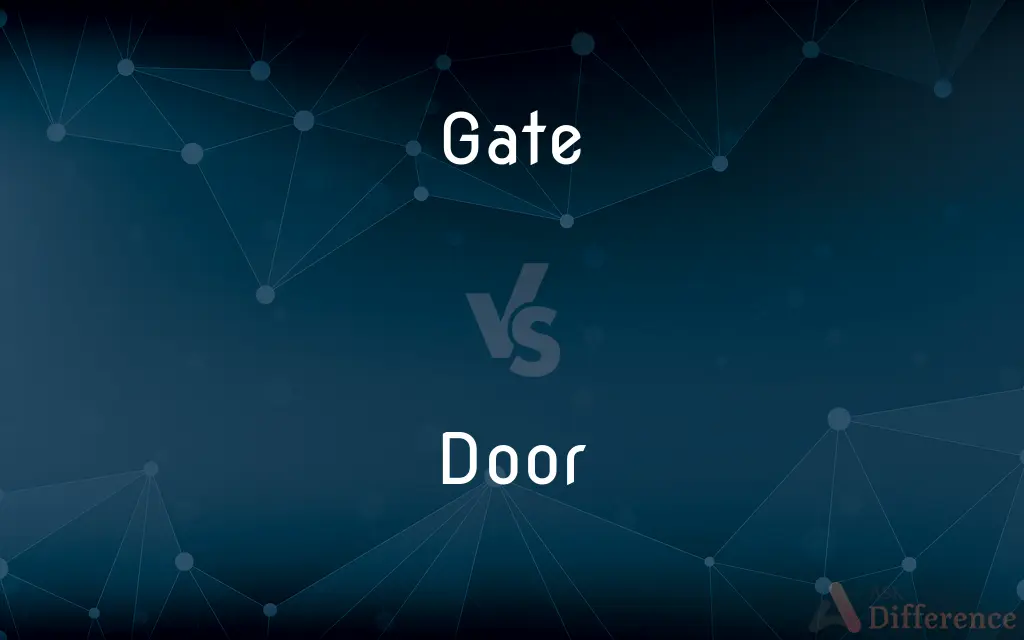Gate vs. Door — What's the Difference?
By Tayyaba Rehman — Updated on October 11, 2023
A gate is typically an external opening in a fence or wall allowing passage, while a door is an entrance to a room or building, often with a solid or paneled barrier.

Difference Between Gate and Door
Table of Contents
ADVERTISEMENT
Key Differences
Gate commonly refers to a structure that serves as a point of entry or exit within a fence, wall, or enclosed space. These can often be seen in gardens, parks, or external boundaries. Conversely, a Door is a moving mechanism used to block off and allow access to an entrance within a building or room.
While Gates are frequently used to protect the perimeters of a property or enclosure, they can be constructed from various materials, including wood, metal, or wire. Doors, meanwhile, are mostly used within the structure of a building, separating rooms or acting as the main entry or exit point.
In terms of design and function, Gates might often be broader and designed to fit vehicles' passage, especially in driveways. Doors are primarily designed for pedestrian use and might have additional elements like peepholes, knockers, or bells.
The locking mechanisms can also differ. Gates might have latches, padlocks, or even electronic systems, especially in modern contexts. Doors tend to have built-in locks, knobs, or handles, and might even incorporate advanced security systems.
Usage in language also varies. Phrases like "gates of heaven" or "city gates" denote broad and grand entrances. Door, however, finds its way into idioms like "behind closed doors" or "door-to-door", highlighting more specific and human-centric scenarios.
ADVERTISEMENT
Comparison Chart
Primary Use
External enclosures
Internal passages in buildings
Typical Material
Wood, metal, wire
Wood, glass, metal
Size and Design
Often broader for vehicles
Mainly for pedestrian use
Locking Mechanism
Latches, padlocks, electronic
Built-in locks, handles
Common Idioms
"Gates of heaven"
"Behind closed doors"
Compare with Definitions
Gate
An entrance or exit at an airport where passengers board or disembark from a plane.
My flight departs from gate 12.
Door
An opening in the wall of a house or of an apartment, by which to go in and out; an entrance way.
To the same end, men several paths may tread,As many doors into one temple lead.
Gate
An electronic circuit with several inputs but only one output that becomes activated only when a prescribed number of these inputs receive signals.
The AND gate gives an output only when both inputs are high.
Door
A movable barrier at the entrance to a building, room, or vehicle.
She knocked on the door before entering.
Gate
A means of access or entry to a place.
The city's eastern gate was beautifully decorated.
Door
A structure that blocks or closes up an entrance or a passageway.
The car's door was dented in the accident.
Gate
A gate or gateway is a point of entry to or from a space enclosed by walls. The word derived from old Norse "gat" meaning road or path; But other terms includ yett and port.
Door
A door is a hinged or otherwise movable barrier that allows ingress into and egress from an enclosure. The created opening in the wall is a doorway or portal.
Gate
A structure that can be swung, drawn, or lowered to block an entrance or a passageway.
Door
A hinged, sliding, or revolving barrier at the entrance to a building, room, or vehicle, or in the framework of a cupboard
She looked for her key and opened the door
That audition was the door to all my future successes
Gate
An opening in a wall or fence for entrance or exit.
Door
A movable structure used to close off an entrance, typically consisting of a panel that swings on hinges or that slides or rotates.
Gate
The structure surrounding such an opening, such as the monumental or fortified entrance to a palace or walled city.
Door
A similar part on a piece of furniture or a vehicle.
Gate
A doorway or walkway in a terminal, as at an airport, through which passengers proceed when embarking or disembarking.
Door
A doorway.
Gate
A waiting area inside a terminal, abutting such a doorway or walkway.
Door
The room or building to which a door belongs:They live three doors down the hall.
Gate
A means of access
The gate to riches.
Door
A means of approach or access:looking for the door to success.
Gate
A mountain pass.
Door
(Slang)To strike (a passing bicyclist, for example) by suddenly opening a vehicular door.
Gate
The total paid attendance or admission receipts at a public event
A good gate at the football game.
Door
To serve as a doorman or doorwoman of (a nightclub, for example).
Gate
A device for controlling the passage of water or gas through a dam or conduit.
Door
A portal of entry into a building, room, or vehicle, typically consisting of a rigid plane movable on a hinge. Doors are frequently made of wood or metal. May have a handle to help open and close, a latch to hold the door closed, and a lock that ensures the door cannot be opened without the key.
I knocked on the vice president's door
Gate
The channel through which molten metal flows into a shaped cavity of a mold.
Door
Any flap, etc. that opens like a door.
The 24 doors in an Advent calendar
Gate
(Sports) A passage between two upright poles through which a skier must go in a slalom race.
Door
(immigration) An entry point.
Gate
A logic gate.
Door
(figurative) A means of approach or access.
Learning is the door to wisdom.
Gate
A path or way.
Door
(figurative) A possibility.
To leave the door open
All doors are open to somebody
Gate
A particular way of acting or doing; manner.
Door
(figurative) A barrier.
Keep a door on your anger.
Gate
Chiefly British To confine (a student) to the grounds of a college as punishment.
Door
A software mechanism by which a user can interact with a program running remotely on a bulletin board system. See BBS door.
Gate
(Electronics) To select part of (a wave) for transmission, reception, or processing by magnitude or time interval.
Door
The proceeds from entrance fees and/or ticket sales at a venue such as a bar or nightclub, especially in relation to portion paid to the entertainers. "The bar owner gives each band a percentage of the door and charges customers more to get in"
Gate
To furnish with a gate
"The entrance to the rear lawn was also gated" (Dean Koontz).
Door
To cause a collision by opening the door of a vehicle in front of an oncoming cyclist or pedestrian.
Gate
A doorlike structure outside a house.
Door
The frame or barrier of boards, or other material, usually turning on hinges, by which an entrance way into a house or apartment is closed and opened.
At last he came unto an iron doorThat fast was locked.
Gate
Doorway, opening, or passage in a fence or wall.
Door
Passage; means of approach or access.
I am the door; by me if any man enter in, he shall be saved.
Gate
Movable barrier.
The gate in front of the railroad crossing went up after the train had passed.
Door
An entrance way, but taken in the sense of the house or apartment to which it leads.
Martin's office is now the second door in the street.
A riot unpunished is but next door to a tumult.
His imaginary title of fatherhood is out of doors.
If I have failed, the fault lies wholly at my door.
Gate
Passageway (as in an air terminal) where passengers can embark or disembark.
Door
A swinging or sliding barrier that will close the entrance to a room or building or vehicle;
He knocked on the door
He slammed the door as he left
Gate
A location which serves as a conduit for transport, migration, or trade.
Door
The entrance (the space in a wall) through which you enter or leave a room or building; the space that a door can close;
He stuck his head in the doorway
Gate
The amount of money made by selling tickets to a concert or a sports event.
Door
Anything providing a means of access (or escape);
We closed the door to Haitian immigrants
Education is the door to success
Gate
(computing) A logical pathway made up of switches which turn on or off. Examples are and, or, nand, etc.
Door
A structure where people live or work (usually ordered along a street or road);
The office next door
They live two doors up the street from us
Gate
(electronics) The controlling terminal of a field effect transistor (FET).
Door
A room that is entered via a door;
His office is the third door down the hall on the left
Gate
In a lock tumbler, the opening for the stump of the bolt to pass through or into.
Door
A means of access or participation.
This scholarship opened the door to many opportunities for me.
Gate
(metalworking) The channel or opening through which metal is poured into the mould; the ingate.
Door
The distance from one building in a row to another.
The supermarket is just two doors down.
Gate
The waste piece of metal cast in the opening; a sprue or sullage piece. Also written geat and git.
Door
A hinged or sliding barrier for closing the entrance of a cabinet, cupboard, or wardrobe.
The clothes are kept behind the closet door.
Gate
(cricket) The gap between a batsman's bat and pad.
Singh was bowled through the gate, a very disappointing way for a world-class batsman to get out.
Gate
(cinematography) A mechanism, in a film camera and projector, that holds each frame momentarily stationary behind the aperture.
Gate
(flow cytometry) A line that separates particle type-clusters on two-dimensional dot plots.
Gate
A tally mark consisting of four vertical bars crossed by a diagonal, representing a count of five.
Gate
A way, path.
Gate
(obsolete) A journey.
Gate
A street; now used especially as a combining form to make the name of a street e.g. "Briggate" (a common street name in the north of England meaning "Bridge Street") or Kirkgate meaning "Church Street".
Gate
Manner; gait.
Gate
(transitive) To keep something inside by means of a closed gate.
Gate
(transitive) To punish, especially a child or teenager, by not allowing them to go out.
Gate
To open a closed ion channel.
Gate
(transitive) To furnish with a gate.
Gate
(transitive) To turn (an image intensifier) on and off selectively as needed, or to avoid damage from excessive light exposure. See autogating.
Gate
A large door or passageway in the wall of a city, of an inclosed field or place, or of a grand edifice, etc.; also, the movable structure of timber, metal, etc., by which the passage can be closed.
Gate
An opening for passage in any inclosing wall, fence, or barrier; or the suspended framework which closes or opens a passage. Also, figuratively, a means or way of entrance or of exit.
Knowest thou the way to Dover?Both stile and gate, horse way and footpath.
Opening a gate for a long war.
Gate
A door, valve, or other device, for stopping the passage of water through a dam, lock, pipe, etc.
Gate
The places which command the entrances or access; hence, place of vantage; power; might.
The gates of hell shall not prevail against it.
Gate
In a lock tumbler, the opening for the stump of the bolt to pass through or into.
Gate
The channel or opening through which metal is poured into the mold; the ingate.
Gate
A way; a path; a road; a street (as in Highgate).
I was going to be an honest man; but the devil has this very day flung first a lawyer, and then a woman, in my gate.
Gate
Manner; gait.
Gate
To supply with a gate.
Gate
To punish by requiring to be within the gates at an earlier hour than usual.
Gate
A door-like movable barrier in a fence or wall
Gate
A computer circuit with several inputs but only one output that can be activated by particular combinations of inputs
Gate
Total admission receipts at a sports event
Gate
Passageway (as in an air terminal) where passengers can embark or disembark
Gate
Supply with a gate;
The house was gated
Gate
Control with a valve or other device that functions like a gate
Gate
Restrict (school boys') movement to the dormitory or campus as a means of punishment
Gate
A hinged barrier used to close an opening in a wall, fence, or hedge.
We installed a new gate at the entrance of our garden.
Gate
A device for controlling the passage of fluid through a pipe or duct.
The water flow is controlled by a gate valve.
Common Curiosities
Can "gate" refer to an airport terminal entrance?
Yes, for instance, "boarding gate."
Are "doors" made of metal?
Yes, doors can be made of metal, wood, glass, and other materials.
Is a "gate" typically external or internal?
A gate is typically external.
Are sliding barriers considered doors?
Yes, sliding barriers can be a type of door.
Is a "door" meant for vehicles or pedestrians?
A door is primarily meant for pedestrians.
Can "door" signify opportunities?
Yes, as in the phrase "open the door to opportunities."
Can doors be part of furniture?
Yes, for example, the door of a cupboard or wardrobe.
Can "gate" refer to a large entrance?
Yes, like the gates of a castle or city.
What is the main function of a gate?
A gate allows or restricts passage through an external boundary or enclosure.
Can "door" be used to describe distance between buildings?
Yes, as in "three doors down."
What is a common material for garden gates?
A common material for garden gates is wood.
Can a "door" be a symbolic term?
Yes, it can symbolize opportunities or transitions, as in "one door closes, another opens."
Can a "gate" refer to an electronic component?
Yes, in electronics, a "gate" can refer to a type of circuit.
Do gates typically have doorknobs?
No, gates usually have latches or padlocks.
How are "gate" and "door" similar?
Both gate and door serve as barriers or passages for entry or exit.
Share Your Discovery

Previous Comparison
Liquidation vs. Liquidity
Next Comparison
Hoop vs. LoopAuthor Spotlight
Written by
Tayyaba RehmanTayyaba Rehman is a distinguished writer, currently serving as a primary contributor to askdifference.com. As a researcher in semantics and etymology, Tayyaba's passion for the complexity of languages and their distinctions has found a perfect home on the platform. Tayyaba delves into the intricacies of language, distinguishing between commonly confused words and phrases, thereby providing clarity for readers worldwide.















































